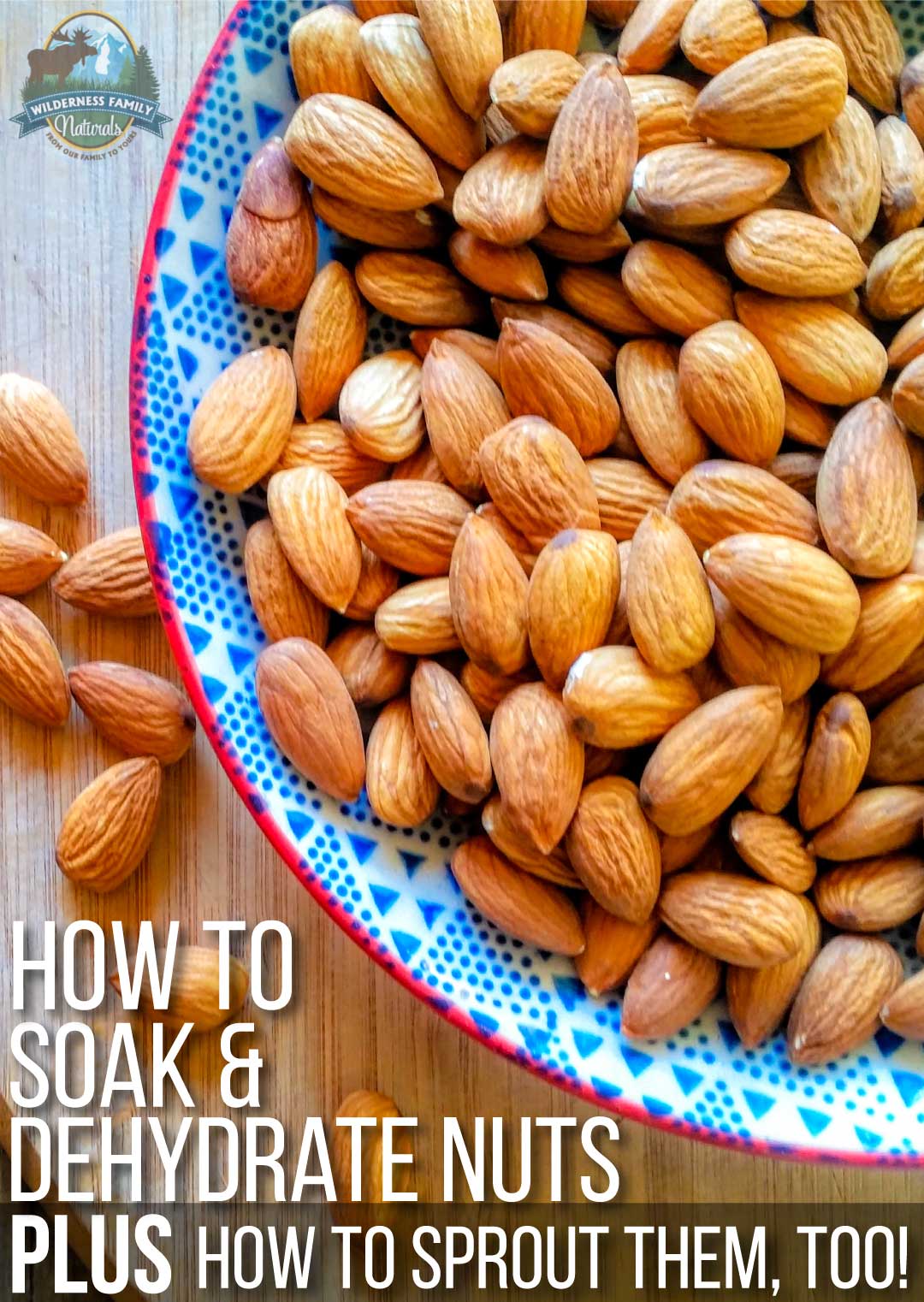How To Soak & Dehydrate Nuts (plus how to sprout nuts, too!)

Did you know there’s a healthier way to eat raw nuts?
Soaking and dehydrating nuts improve nutrient bio-availability and reduces naturally occurring anti-nutrients.
Traditional cultures have been soaking nuts in seawater for centuries. We have since discovered the nutritional benefits of replicating this practice through the use of warm water and sea salt.
The Benefits of Soaking Raw Nuts
Similar to legumes and grains, nuts contain phytic acid which exists to protect the nut until suitable conditions arise for the nut to germinate and grow. Nature has it all figured out!
When eating nuts, this phytic acid binds to certain minerals and transforms into a phytate. Unfortunately, phytates inhibit your body’s ability to absorb these nutrients.
Consequently, symptoms such as gastrointestinal irritation and digestive issues arise in some people, resulting in nutrient deficiencies. This is contrary to the effect I’m sure most of you are going for when eating otherwise highly nutritious food. The caveat here? Nuts are only a nutrient-dense food when they’re prepared correctly — soaked and sprouted, then dehydrated.
The combination of warm water and the minerals in sea salt help to break down phytic acid by activating other helpful enzymes.
Why Soak & Sprout Raw Nuts?
Soaking nuts helps to break down this phytic acid, making the nuts more digestible. Sprouting goes a step further.
After several cycles of soaking and rinsing, and allowing the nuts a little bit of air, germination will occur. This further breaks down the enzyme inhibitors as the nuts are releasing their protective shield and unlocking stored nutrients to prepare for growth.
Do note: some nuts like pecans and walnuts will not sprout. The best candidate for sprouting is the humble almond.
Still, if you desire to make pecans, walnuts, cashews, brazil nuts, hazelnuts, and other nuts easily digestible and their nutrients fully available, you can simply soak in warm water and salt, then dehydrate.
Why Dehydrate Nuts?
It’s important to dehydrate your soaked nuts because if left out, the moisture in the nuts will result in mold growth. Dehydrating helps to prolong shelf life.
It’s a gentle, low-heat process that will preserve the nutrient goodness unlike high heat roasting — which is how most store-bought nuts are processed. Dehydrating leaves you with a crispy, crunchy nut.
The ideal temperature to dehydrate nuts is around 110°F, although 150°F is permissible. Low and steady heat is preferable to avoid damaging the heat-sensitive natural enzymes and nutrients. This will also help to preserve the unsaturated fatty acids which are unstable at high heats. When nuts are dried or roasted at high temperatures, these fatty acids become rancid while enzymes and nutrients are destroyed.
Soaked and dehydrated nuts have a delicious crispy texture that one would traditionally achieve through roasting. This is all without the added vegetable oils commonly used in roasting and the high heat processing that damages the nutrients. Win!
This recipe is the base for one cup of nuts. Each dehydrator has a different capacity so multiple this recipe as needed.
Do you know about soaking and dehydrating nuts? Do you know how to sprout nuts?
- 1cup raw nuts
- 2cups warm filtered water
- 1tablespoon Wildly Organic Himalayan Pink Salt
-
Add the nuts, salt, and warm water to a bowl.
-
Stir gently to dissolve the salt.
-
Cover the bowl with some cheesecloth or tea towel to allow air in but keep critters and dirt out.
-
Soak the nuts for 24 hours.
-
Then drain the water and rinse through a colander.
-
Spread the nuts across your dehydrator trays.
-
If your dehydrator has a 'nuts and seeds' setting, use that. If it's manual, turn it up to 115 degrees F.
-
Leave the nuts to dehydrate for around 18-24 hours (this will depend on your dehydrator and the amount of nuts you are dehydrating).
-
You can monitor them throughout this process and have a little taste test.
-
Allow to cool before storing in an air-tight container.
-
Follow steps 1 to 5 above.
-
Once you've soaked for up to 24 hours, using a shallow baking dish or tray, spread the nuts out evenly.
-
Add just enough water so there's a shallow pool (you do not want to submerge them completely).
-
Leave them on the counter bench so they have access to air. This will help with the germination process.
-
Monitor your sprouts. They may take anywhere from 2-5 days.
-
Every 12 hours, rinse the sprouts with fresh water and repeat.
-
Keep sprouts in the fridge for up to 5 days.
- Almonds: soak for 12 to 24 hours, then sprout for 2-3 days.
- Brazil nuts, cashews, hazelnuts, macadamias, pecans, pistachios and walnuts do not sprout. Soak for 12 to 24 hours, then dehydrate.
The post How To Soak & Dehydrate Nuts (plus how to sprout nuts, too!) appeared first on Wildly Organic.